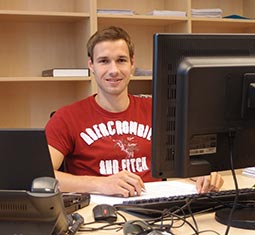June 13, 2012
IST Student Co-author of Bert Vogelstein in Nature
Mathematical modeling of therapy resistance in colorectal cancer • Insights into treatment improvements

Johannes Reiter, PhD Student in the group of computer scientist Krishnendu Chatterjee, is co-author of a Nature publication (appearing online June 13) by cancer scientist Prof. Bert Vogelstein, one of the world’s most highly cited scientists with currently 196,353 citations (Web of Knowledge). Their work explores the development of resistance to treatment of colorectal cancer using the drug “panitumumab”, and gives valuable insights into possible improvements of the therapy for this cancer type.
KRAS is an oncogene, which has the potential for causing colorectal tumors. Tumors which do not display mutations in KRAS are frequently treatable with panitumumab. However, they almost always develop resistance to the drug within several months of therapy. The researchers analyzed circulating, cell-free DNA of patients for the occurrence of new mutations in KRAS. In all cases of newly occurring mutations, the researchers demonstrated the development of resistance against panitumumab. Through mathematical modeling of the tumor growth process, the scientists were now able to show that resistance-causing secondary mutations in KRAS are already present in very small subpopulations before the start of therapy and do not arise as a direct response to therapy. This finding offers insights into the therapy of colorectal cancer: to circumvent the almost inevitable development of resistance, efficient therapy needs to target at least two different cancer-promoting genes and be used in combination.
Johannes Reiter’s contribution was the mathematical analysis of mutations’ occurrence and the validation of analytical results by stochastic computer simulations. Born 1986 in St. Pölten, he studied Software and Information Engineering at the Vienna University of Technology. After completing the Bachelor’s program, Johannes Reiter joined IST Austria in 2010 for his doctoral studies in the group of computer scientist Krishnendu Chatterjee. Together with the group of Martin Nowak, Professor at Harvard University, he works on the modeling of biological processes.



